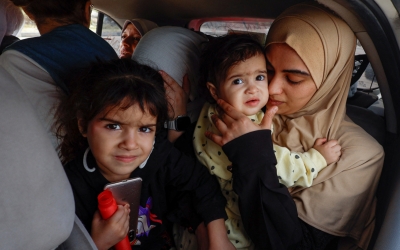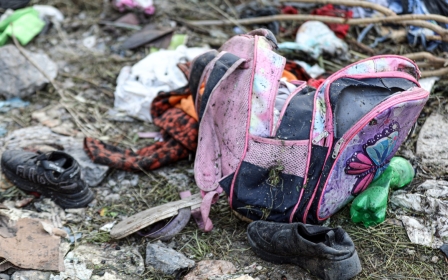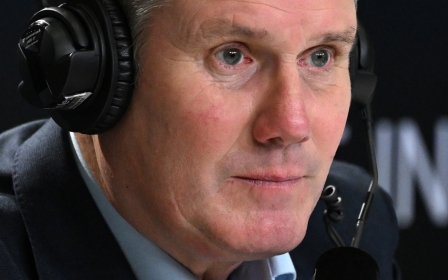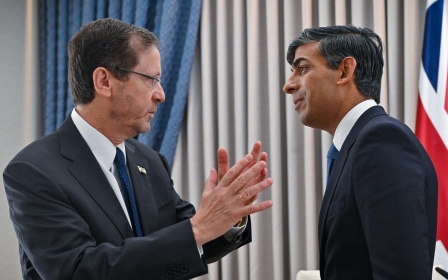Israel-Palestine war: British Palestinians mourn their loved ones from afar
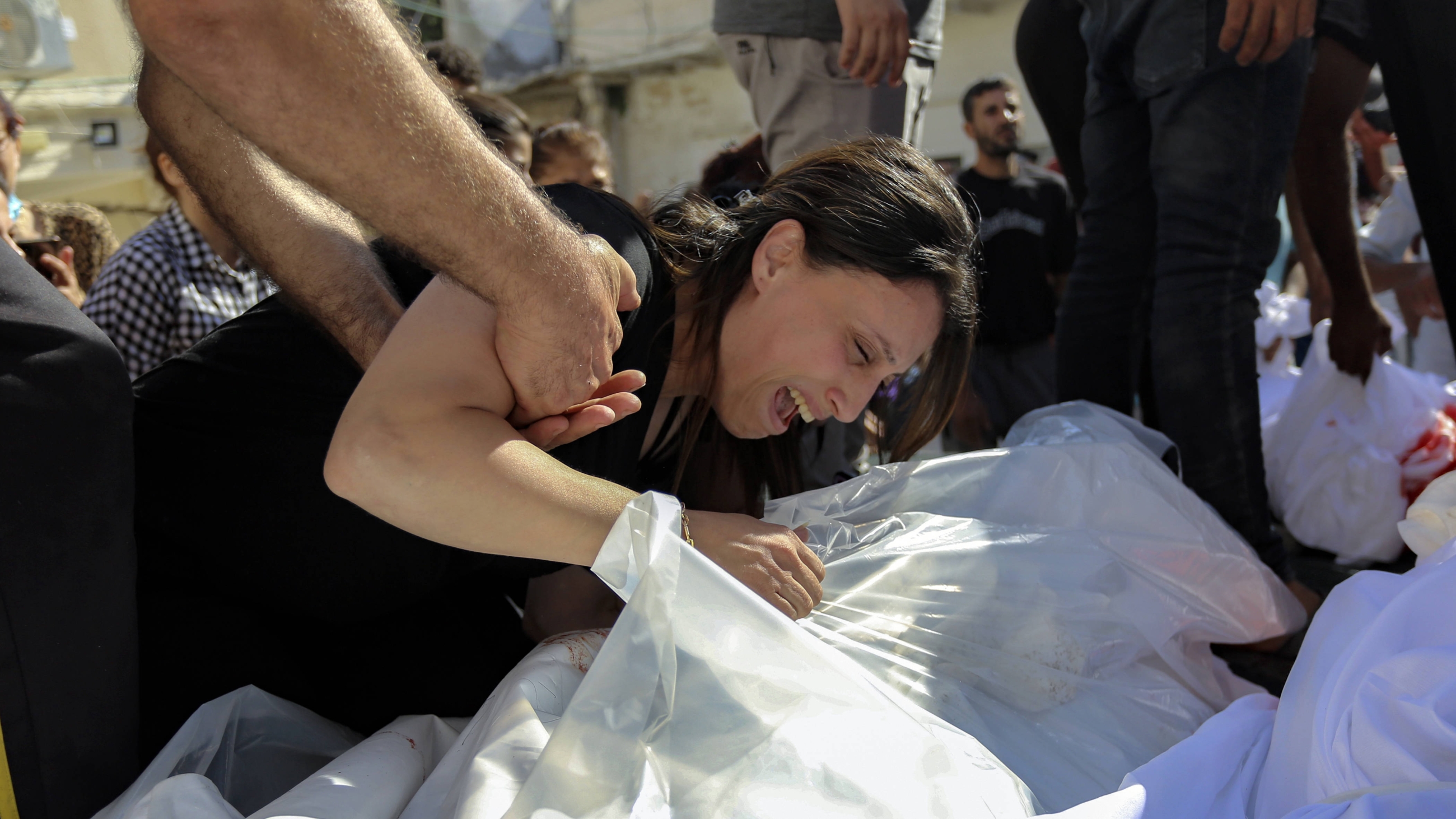
As the war unfolded in Gaza and Israel on 7 October, Wala, a British-Palestinian pharmacist born and raised in Wales and whose extended family live in Gaza City, watched the news with horror from afar.
The Israeli military has been conducting an unrelenting bombing campaign on Gaza since 7 October, when Palestinian fighters launched a massive attack in southern Israel, killing 1,400 people and taking 200 hostage.
At least 4,200 Palestinians have been killed, and among them, Wala has come to know, 15 members of her family.
Early on 15 October, she received a call from a cousin with news the family had been dreading.
"'Your uncle's house has even bombed and they've all died,' he told me. Fifteen of them had been killed," Wala said, speaking to MEE using only her first name for fear of backlash.
New MEE newsletter: Jerusalem Dispatch
Sign up to get the latest insights and analysis on Israel-Palestine, alongside Turkey Unpacked and other MEE newsletters
"My uncle and his wife, three of their adult children, my cousin and her two babies, and the rest of them children."
With Gaza crippled by a renewed siege implemented by Israel in retaliation to the attacks, which has fully restricted any entry in and out of Gaza and includes power and water cuts, many Palestinians have been left with little to no resources to rescue loved ones trapped or lying dead under the rubble.
Wala's family are among more than 1,500 children and 1,000 women killed in Israel's relentless bombings.
Follow Middle East Eye's live coverage for the latest on the Israel-Palestine war
"My cousin was postpartum, and her baby was 17 days old. She was under the rubble for two days. Eventually one of my uncles dug her out with his hands and nails," Wala said. "The baby was in pieces."
So far, 12 bodies have been recovered, and the bodies of three children remain under the rubble.
Burying a whole family
Dozens of Palestinian families have been wiped out entirely, among them Razan Shamallakh's relatives.
The British Palestinian has at least 150 close relations in Gaza, where her family home sits by the sea. A day into the bombing campaign, three generations of her family were killed in one Israeli bombing.
Her uncle, his wife, his five sons and his grandchildren were killed when their house was struck while they slept. The youngest grandchild was two months old, the other two years old.
"They weren't able to recover many of the bodies," Shamallakh said of the intensity of the blast.
"You can never really imagine this happening to your own family, but it did unfortunately. These were people who were living normal, basic lives."
Her relatives, she said, were not politically active. One cousin worked in a dessert shop, another worked in a phone shop, a third was a taxi driver.
"Just imagine having to bury a whole family of 10, but not even full bodies, just parts of the bodies. This has traumatised our whole family."
Until two days ago, other members of her family in Gaza had lived in the north, but they were forced to the south after a warning missile was fired by Israel on their area.
With no water access, Shamallakh said her surviving family had resorted to drinking sea water.
"I've heard one or two of my relatives say, 'If you ask us, are you OK, and we say yes we are,' what we really mean is we haven't been killed yet."
'We do not matter'
Since the beginning of the war, the United Kingdom has given Israel its full support to Israel and said it acknowledges its right to self-defence. Both the Conservative and opposition Labour Party have yet to call for a ceasefire.
The position of the UK government and the opposition has met with disappointment by British Palestinians.
"The ongoing rhetoric pacifying and excusing these horrific acts of terror on the people of Gaza once again is soul crushing," said one Palestinian woman living in the UK, who asked to remain anonymous.
The woman's pregnant cousin was killed along her two children and mother-in-law in a bombing on al-Rimal neighbourhood.
'She was under the rubble for two days. Eventually one of my uncles dug her out with his hands and nails. Her baby was in pieces'
- Wala, British Palestinian
"Never have I been ashamed of [my British identity] until this moment. Our government is a disgrace. The unshakeable support for this onslaught is astounding. No matter what Israel does to Palestinians, we do not matter," she said.
Hamas's unprecedented attacks and Israel's relentless bombardment of the Gaza Strip have made Jewish and Muslim communities around the world vulnerable, causing spikes in incidents of antisemitism and Islamophobia to increase significantly in the UK, according to the Metropolitan police.
Between 29 September and 12 October, there were 105 reports of antisemitic incidents and 75 antisemitic offences, and 58 Islamophobic incidents and 54 Islamophobic offences, according to data published by the Metropolitan Police.
"I know that we have seen a rise in Islamophobia. It is deeply worrying and concerning that this is spilling onto the streets of the United Kingdom," Naz Shah, the member of parliament for Bradford West and vice chair of the All Party Parliamentary Group for British Muslims, told MEE.
In the US, the murder of Wadea al-Fayoume, a six-year-old Palestinian-American boy who was stabbed 26 times, and the serious wounding of his mother, in an attack by their landlord in Chicago, were linked to the ongoing Israel-Palestine war, reopening the fears of Islamophobia faced by Muslim communities around the world following the 9/11 attacks.
"I'm so worried for my safety, for my children's safety, for my parents and the whole community's safety to be honest, whether they're Palestinian or not," Wala said.
'Protesting oppressive occupation'
In the United Kingdom, there has also been an increasing crackdown on those voicing support for Palestinians, not just Hamas, which was labelled as a terrorist organisation by the government in 2021.
In a letter last Tuesday, the UK's Home Secretary Suella Braverman urged police chiefs to consider whether waving a Palestinian flag could be a criminal offence.
In light of recent pro-Palestinian protests in London, the Metropolitan Police have since assured protesters that "expressions of support for the Palestinian people more broadly, including flying the Palestinian flag, does not, alone, constitute a criminal offence".
'Just imagine having to bury a whole family of 10, but not even full bodies, just parts of the bodies. This has traumatised our whole family'
- Razan Shamallakh, British Palestinian
But with reports emerging of pro-Palestinian protests being conflated with supporting terrorism by major news organisations and on social media platforms, and incidents of pro-Palestine supporters being stopped by police across Europe, there are fears that criticism of the most right-wing Israeli government in history could be mistaken for antisemitism.
"If we say anything about stopping the genocide of Palestinians, does that mean we want death for others? No," Wala said.
"If you go to any Palestinian protest or speak to any person who is pro-Palestine, they do not wish death on anybody because it's against our faith as Muslims. What people protest against is the oppressive occupation."
Even British Palestinians working on the front lines of Israel's bombardment of Gaza have faced undue scrutiny.
Professor Ghassan Abu-Sittah, a British-Palestinian plastic surgeon who has been working voluntarily in Gaza, said on X, formerly Twitter, that British counter-terrorism police turned up to his family home in the UK on 16 October to ask why he was in Gaza and who paid for his ticket.
"I think it's a kind of brutish attempt at harassment and silencing," Abu-Sittah told British broadcaster Victoria Derbyshire.
"I remain committed to speaking out on behalf of my patients, on behalf of the wounded here, on behalf of these families that are being destroyed. There are 50 families that have been wiped out [from] the civil registry, which means that the grandparents, the parents, and the grandchildren were all killed."
'We've become their voices'
With communications with Gaza almost entirely blacked out because of power cuts enforced by Israel's siege, social media has become a significant platform for Palestinians living in the diaspora to voice their grief and to share photos of loved ones killed by Israeli bombardments.
Wala described how she and her family every morning await news on their phones of whether other members of their family have made it alive through the night.
"We barely go to sleep to be honest," Wala said. "The problem is now, because of the reduced electricity and internet, Palestinians who are posting from [Gaza] are not able to post during the night. In the morning, we find out that actually there has been been bombing all night."
Among those sharing their grief online is Malaka Shwaikh, a Palestinian researcher with family in Gaza, who has lost seven members of her family, including her cousin and her cousin's three children, Ahmed, Yamin, and Maryam.
"We're not with them," Wala said of her own family in Gaza, "but what I've noticed is that we've become their voices."
Middle East Eye delivers independent and unrivalled coverage and analysis of the Middle East, North Africa and beyond. To learn more about republishing this content and the associated fees, please fill out this form. More about MEE can be found here.


